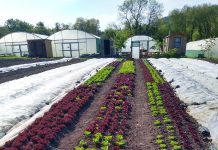May is a terrific month of promise and growth. Days are long, the soil is warming and the garden is filling with ebullient green leaves.
The sunny and warm April has brought crops on at a great pace. Tomatoes, melon, peppers and aubergine were transplanted in the greenhouse in mid April, and we have picked our first ripe peas in the tunnel, from a November sowing. Courgettes, sweetcorn, runner and french beans planted in early April, will also have to be transplanted outside early.
Planting high summer crops outside this early is a gamble. If really warm then you will have an early crop. If it turns cool and wet the slugs and snails move in big time. Fleece or cloches for a fortnight help a lot whatever the weather.
Don’t worry if you haven’t planted yet: sowing later makes establishment much easier, and the first pick is only a few weeks later.
The planting of early and second early potatoes outside in late January and early February needed earthing up by mid-April too. This means they will be ready well before blight gets going, and there will be time to grow another crop on the same soil. Since we have a lot of it we have taken to earthing up using bucket loads of rotted manure, which is easy to do, disturbs the soil less, and feeds and mulches it.
Those crops that came up after heavy rain on Good Friday, such as my Martock beans, are now growing very slowly in the dry weather. Watering would help, and is important when they are flowering, to help set seed. What will really make it all grow is a good rain followed by warm sunny days, as humid air makes a big difference. In dry periods, plants somehow store energy and then explode with growth when it rains.
This is also true of weeds. Please don’t sit back: although they are tiny, they can still set seed, and they are easy to kill by hoeing on a dry day. And how do you tell the difference between a weed and a valuable plant? Give it a gentle tup, and if it comes out, it is a valuable plant.
What to sow in May:
Virtually all summer crops can be sown this month if you haven’t already. Winter cabbage and purple sprouting. Second crops of lettuce and beetroot.








